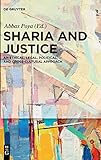Sharia and justice : an ethical, legal, political, and cross-cultural approach / edited by Abbas Poya.
Publisher: Berlin : De Gruyter, [2018]Copyright date: @2018Description: 180 pages : illustrations ; 24 cmContent type:- text
- unmediated
- volume
- 9783110459616
| Item type | Current library | Home library | Collection | Call number | Materials specified | Copy number | Status | Date due | Barcode | |
|---|---|---|---|---|---|---|---|---|---|---|
| AM | PERPUSTAKAAN TUN SERI LANANG | PERPUSTAKAAN TUN SERI LANANG KOLEKSI ISLAM-P. TUN SERI LANANG (ARAS 4) | - | BP144.S547 ki (Browse shelf(Opens below)) | 1 | Available | 00002223909 |
Includes bibliographical references and indexes.
Ordinary justice : a theology of Islamic law as a social contract / Rumee Ahmed -- Conditions for a good world: the concept of comprehensive justice by Abu al-Hassan al-Mawardi (972-1058) / Abbas Poya -- Justice as a political principle in Islam / Werner Ende -- Justice and equality and Muslim family laws : new ideas, new prospects / Ziba Mir-Hosseini -- Islamic law and justice / Mathias Rohe -- Jihad and just war theory : a conceptual analysis / Abbas Poya -- The Islamic veil and justice / Bernd Ladwig -- Name Index -- Subject Index -- Short biographies.
Justice is considered the basic norm of human coexistence. Every legal order refers to the concept of justice, and Muslims also regard their religious norms (the Sharia) as offering just solutions to legal questions. But is the assumption that the Sharia is just merely an acceptance of a status quo correct? And is justice the necessary aim of the Sharia? In this volume, renowned scholars discuss these questions from different perspectives. In principle, the first normative source of Islam, the Qur'an, orders justice and fair conduct (Rohe). At the same time, an analysis of the concept of justice in the classical age of Islam (Ahmed and Poya) also shows that there existed ambivalent understandings of this concept. The relationship of the idea of justice in Islam to political questions (Ende), to war (Poya), and to modern reform (Mir-Hosseini) again confirms the importance of the concept for a critical reflection on traditional assumptions and existing circumstances. The discussion on the hijab in Western countries (Ladwig) shows paradigmatically how justice can regulate the relationship between the secular state and the Sharia. The essays in this volume endeavor to show that debates about justice, in Islam as well, express an underlying tension between the perception of an order as just on the one hand, and the feeling of injustice under the same order on the other. This discussion validates the idea that justice should be understood as a concept subject to a perpetual reexamination according to changing times and circumstances.
There are no comments on this title.

